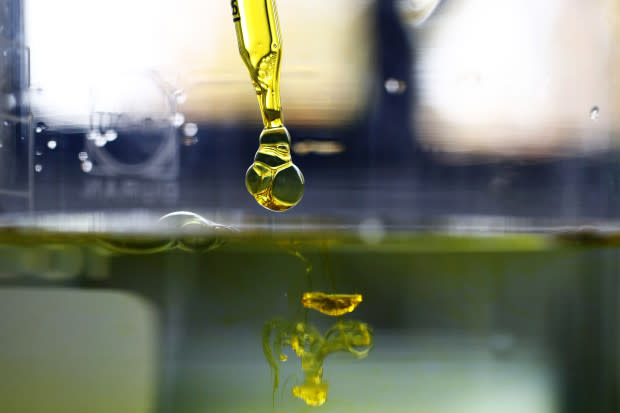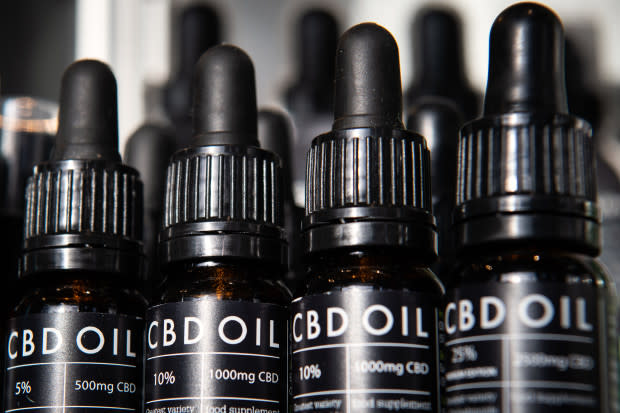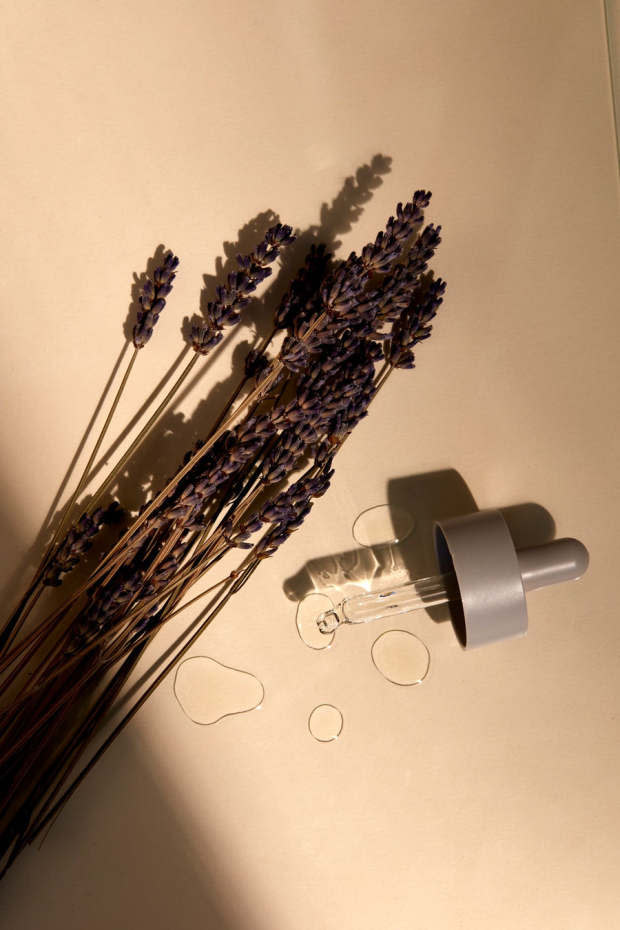What Happened to Beauty's Obsession With CBD?
"CBD needs a really good publicist," says Kirbie Johnson, Los Angeles-based beauty journalist and co-host of podcast Gloss Angeles.
Her statement would've sounded ludicrous just a few years ago. As recently as 2020, CBD — or cannabidiol, one of more than 100 cannabinoid compounds present in the cannabis sativa plant — was everywhere. It seemed like hundreds of oils, drinks, topicals and candles spiked with the non-psychoactive substance were entering the market each month. Its associated claims were wide-ranging, and included relief from stress, pain and anxiety (when ingested) as well as anti-inflammatory and hydration-boosting properties (when applied topically).
"Wasn't it in leggings at one point?" recalls Charlotte Palermino, a licensed esthetician, content creator and the founder of Dieux Skin. She's correct: It was.
But in 2023, cannabis-centric brands are leaving the beauty market and others are quietly deleting CBD from their labels. The ingredient appears to have moved on from its (mega)boom phase and squarely into its bust era. How did CBD go from the most popular girl at the party to yesterday's news?

Photo: Stefan Wermuth/Bloomberg via Getty Images
CBD started gaining steam in cosmetics around the time the 2018 Farm Bill was passed. This landmark decision legalized hemp in the U.S., so long as the THC content was under .3% and changed the cannabis world as we know it. After it cleared, some thought the market would flood with even more CBD brands, and it did — at least for a while.
Casey Georgeson, founder of Saint Jane Beauty, an elevated CBD skin-care brand, dubs 2019 the ingredient's heyday, and Johnson agrees.
"2019 through the beginning of the pandemic, that is when we hit the fever pitch," Johnson says. "Every day, it was nonstop CBD [PR] pitches."
According to a Social Standards trend report, consumer interest in CBD for beauty increased 279% year-over-year in 2019. That was also the year Sephora committed to selling the ingredient both in-store and online, and in an effort to combat confusion and skepticism surrounding the ingredient, the retailer, with the help of CBD skin-care brand Prima, instituted its own CBD standards for brands sold at Sephora shortly thereafter.
It wasn't the only retailer to throw its support behind the ingredient. Barneys New York's Beverly Hills location added its own cannabis section called "The High End." Neiman Marcus announced it would be carrying an assortment of luxury CBD products online and in a handful of its stores across the country. Niche retailers solely devoted to cannabis, like Standard Dose, Fleur Marché and Poplar, also began popping up.
From vitamin C to snail mucin, beauty ingredients trend all the time, but CBD felt different.
"[CBD] is different for many reasons, from the political to the personal," says Amanda Mitchell, senior beauty writer at Refinery29. Mitchell believes some of CBD's initial success was wrapped up in its "taboo" nature. She describes a perfect storm of the right place, the right time and the right legislation.
However, the cannabis connection proved not to be a sustainable marketing technique. "I think that initial allure faded to a lot of miseducation," Gilah Elul, co-founder of indie cannabis beauty line Muri Lelu, tells Fashionista. "Where people were seeing CBD, they were seeing it connected to these weed puns and just overall marketing about cannabis, but they didn't really understand how it played a role in the plant at large."
Johnson agrees. "Everyone was trying to capitalize on the 'high' of it all, that it took away from what the product was actually doing," she says. "CBD is a really great molecule for moisturizing the skin and calming inflammation, but that wasn't something that was articulated through brand messaging."
CBD won't get you high, and it certainly won't when applied topically. That being said, the research is limited when it comes to exactly how it affects the body. Some studies have been done, but many more are necessary to understand the ingredient's full scope. At CBD's peak, not only was the aisle bursting with options, but it was also bursting with claims.
Despite limited modern research on the ingredient, though, CBD has been extensively documented in Traditional Chinese Medicine. "Because of how powerful [CBD] is, it was at one point only allowed to be used by royalty," says Helina Fan, co-founder of Redmint and practitioner of TCM. "In Chinese medicine, herbs usually work as a group, but CBD is powerful enough to use on its own."
But the ingredient's powerful claims were, to an extent, its downfall. "Imagine if everyone was like, 'Oh, yoga is going to cure your cancer,'" says Palermino. "That's basically what happened with CBD. People said it with their chest, it got published — and it was bizarre."
Then, the pandemic changed everything.
"The pandemic should have been the time for CBD to shine," says Johnson. "Brands definitely were capitalizing on the fact that a lot of us were not well — physically, mentally, emotionally — and they were capitalizing on the fact that we needed something to relax and we needed something to calm. But the disconnect was that there's a difference between taking something orally and taking something for the skin."
Johnson and Palermino weren't the only ones who saw issues with the ingredient's marketing.
"CBD does work," says Fan. "But you have to set the right expectation. It is not a magic solution."
The overblown marketing claims and the sheer number of brands created a level of CBD fatigue. In February 2022, Beboe Therapies, once dubbed "the Hermès of marijuana" by The New York Times, closed down. In January, Kristin Bell's CBD skin-care brand, Happy Dance followed suit and announced it was also shutting down.
Only a few months later came the most significant blow for lovers of CBD beauty. In June 2023, Lord Jones, a beauty-editor favorite and one of the pioneers in the CBD beauty landscape (which also owned the aforementioned Happy Dance), announced that it was discontinuing sales in the U.S. market.
"Lord Jones is the beauty brand I think of when I think about CBD," says Johnson. "It's a shame that they're not around anymore because they were doing things really right."
"Covid was a really tough time for CBD," confesses Saint Jane's Georgeson. "When most direct-to-consumer brands were growing like crazy, CBD was still a very restricted category. There weren't many outlets to advertise in. [Saint Jane] was very fortunate to continue to grow, but I know a lot of companies did not, and it was a very hard time."
Talk about a come down.
Other skin-care brands like The Feelist and WLDKAT began phasing out their CBD products in 2021. Microbiome-friendly brand House of GRO recently decided to join their ranks, removing CBD from its formulas.
"We decided to refocus on our roots, which is why CBD is no longer going to be integrated into House of GRO formulas, explains co-founder, Irina Gottesman. "Now we're going to be putting more of an emphasis on our most treasured ingredient, which is the rare chaga mushroom."
As for the retailers, their attitudes also seemed to change. Sephora's website currently sells only 25 CBD-spiked products from six brands: Saint Jane, Prima, Flora and Bast, Kiehl's, Herbivore Botanicals and Ellis Brooklyn. However, while reporting this story, Ellis Brooklyn informed Fashionista it's also planning to discontinue its CBD products. Both Ellis Brooklyn and Sephora declined to comment further for this story.
Barneys Beverly Hills is, of course, no longer. Target started selling a CBD oil, but within a week, the item was pulled off of shelves. (Target also declined Fashionista's request for comment.)
Brick-and-mortar stores turning their backs on the products is another sting for CBD backers, who have already struggled with e-commerce and advertising restrictions. Shopify requires more investment up front for CBD brands, and Paypal, AfterPay and Apple Pay do not accept CBD merchants. In an interview with Glossy, The Feelist and WLDKAT lamented how difficult it was for smaller brands carrying CBD to make it in the space.
Elul has experienced similar struggles: "Having healthy e-commerce is a huge part of any business and growth potential," she says. "And being a cannabis brand, a CBD brand, makes that infinitely harder."
Google eased its previous restrictions, deciding in January of this year to allow advertising for topical CBD products. "Meta now allows educational content, so we've been really doubling down on a blog strategy and we've been encouraged to see that the blogs are driving healthy traffic," explains Elul.

Photo: Leon Neal/Getty Images
Outside of advertising woes, CBD has also had an ownership issue. "As we see marijuana become more decriminalized, we're now wondering who the face of marijuana in this country is going to be," says Refinery29's Mitchell. "Black people and non-white people have been going to jail for years because of marijuana. Now, white women are somehow becoming the face of it."
It's no secret that many major cannabis beauty brands are white-owned, and capitalizing on a plant that previously incarcerated so many, especially Black and Brown folks, can come off as tone deaf.
Elul's brand Muri Lelu recognized this disparity from the start: "I'm a Black and Jewish woman, and I felt that I could not possibly create a brand that was profiting off the sale of CBD without thinking about the impact," she says. "If we're able to sit here and sell CBD while [there are] folks that have had their lives and communities upended [because of cannabis], we wanted to make a stance that felt authentic to cannabis culture." Muri Lelu donates a portion of sales to The Last Prisoner Project, a nonprofit organization that is fighting for the "full freedom" for those incarcerated due to cannabis, as well as the FLORIC Collective.
Unlike Muri Lelu, Dieux Skin is not rooted solely in CBD-based formulas. In fact, only one of its products contains the ingredient: the Deliverance Soothing Trinity Serum. Yet, Palmerino believes respect for the ingredient and its cultural implications is paramount.
"If you're going to be using this plant, you should be using it in a very responsible way, but also you should be using it in a scientific way," she says. "For us, we donate a dollar of every sale to efforts to help combat the war on drugs. We are very open about it, but we're also very cognizant that two of our founders are white women. It's something that we take very seriously."
Despite all of the setbacks surrounding CBD, many beauty brands and founders aren't ready to give up on it completely. Palermino openly admits Deliverance is her favorite product from the line. "I can't handle tretinoin without it, and I'm definitely not giving that up," she says.
Johnson also cites Dieux's serum as one of her favorite CBD products on the market. Even though life for the brand would be easier without it, Palermino believes the formula would suffer if it omitted CBD. "Therefore, we are keeping it in," she says.
For Muri Lelu, the passion and commitment for the ingredient remains strong. "We always say our mission is to elevate cannabis and put it front and center in the beauty conversation," says Elul. "Consumers are starting to see ingredient sourcing as an element of 'clean' beauty. They are wondering about the social impact of what it takes to get my product to me. We are trying to help shape that narrative."

Photo: Courtesy of House of Gro
Even House of GRO still believes in the ingredient, despite its decision to leave it behind. "CBD was a great ingredient for us. It worked wonderfully with chaga," says Gottesman. "Our community was just more interested in mushrooms, so we listened to [them]."
What does the future hold for CBD in the beauty space? Only time will tell, but our interviewees hope for more research.
"If we really want to see the benefits of CBD in skin care, there needs to be more studies around it, like, [researching] what percentage needs to be in a product for it to be actually efficacious, to see real results from a CBD product," says Johnson.
Mitchell echoes this sentiment and tacks on a note about brands embracing transparency: "Where is your CBD coming from? Who is it coming from? Where is the farm? How is the farm giving back to people incarcerated on marijuana crimes? How are you working towards getting marijuana decriminalized and destigmatizing it? It's my hope that CBD brands have answers," she says.
As for Georgeson, she's keeping the faith. "I believe CBD will have a renaissance," she says. "In a few years, it will be a mainstay for formulators looking for a beautifully calming ingredient for formulas."
Please note: Occasionally, we use affiliate links on our site. In no way does this affect our editorial decision-making.
Want the latest fashion industry news first? Sign up for our daily newsletter.
